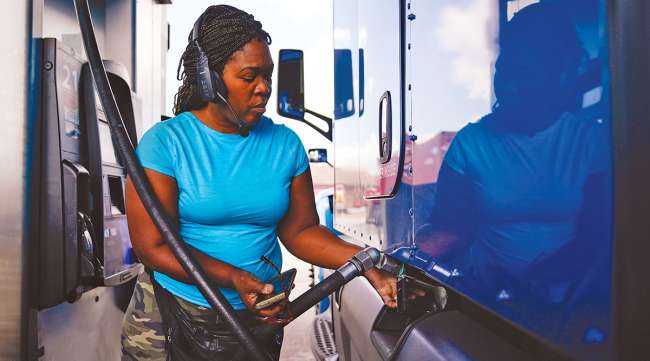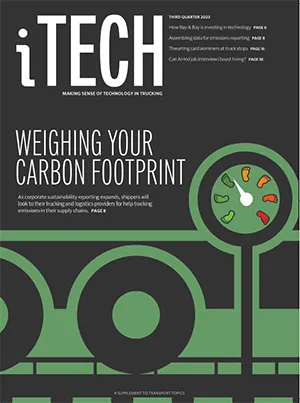Co-founder and President, Relay Payments
Card Skimming at Truck Stops Is a Huge Problem for Fleets

[Find the latest in trucking technology: Explore this quarter's issue of iTECH]
Many of us have had to deal with the unfortunate problem of credit card fraud. You look at your monthly card statement and your eyes get wide after seeing the total. Then, you notice several large purchases you never made and realize your card number was stolen. Although most card issuers reimburse consumers for fraudulent charges, you’re still left with the headache of getting a new card number and ensuring it’s set up across all your recurring payments.
Now take this example and multiply it by hundreds of instances each day. This is what’s happening in trucking right now, for diesel fuel purchases at truck stops across the country. When you consider the average diesel fuel fill-up for truck drivers totals $450, it should come as no surprise that this is a massive problem for the industry. Because consumers are typically not liable, the bank and the merchants themselves are left holding the bag, often leading to negative outcomes and repercussions that reverberate through the ecosystem.
An Age-Old Problem
The fraud occurring at truck stops is the result of an age-old crime: card skimming.
Card skimming involves the use of illegal devices that steal credit or debit card information from unsuspecting individuals. Skimmers are installed on ATM machines or fuel pumps, where they capture sensitive data when a driver swipes their card. Truck stops are particularly vulnerable to card skimming due to the fact that truck drivers still swipe cards at pumps on a daily basis.

Q3 iTECH
►Industry Tackles Carbon Tracking
►Fleets Test Carbon Capture System
►UT Unveils Fleet Sustainability Index
►Card Skimming at Truck Stops
►Q and A: Bay & Bay's Wade Anderson
►Dysart: Using AI for Job Interviews
►Clevenger: Roads to Decarbonization
Explore the Issue!
Because fuel cards are a primary form of payment in the trucking industry, card skimmers will collect the information to create a dummy fuel card. Once created, the scammer will “purchase” fuel (on the driver or carrier’s dime) and resell it for their own personal profit. While carriers and fuel-card issuers often set daily spend caps to limit fraud risk, scammers have various ways of working around this.
As one of the largest contributors of fraud within trucking, card skimming is affecting both large chains and smaller independent truck stops. The actual cost of fuel skimming to the trucking industry is unclear, but experts have estimated it’s millions of dollars each month. Overall, credit services company FICO reported that the number of cards compromised by skimming activity across all businesses increased 368% in 2022.
Trickle-Down Effects
So what happens when a card is compromised through skimming?
The scammer begins making fraudulent purchases using the stolen card details, sometimes charging thousands of dollars over subsequent days before the fraud is spotted. Once aware of the fraud, the fleet may freeze the stolen card, leaving the driver without a fuel card to use while on the road.

Barkoff
As the back office deals with reimbursement claims and verification processes, the driver is left with no option but to use other payment methods while they wait for a new card to be issued. Whether cash, a personal credit card or other payment type, this scenario typically means the driver pays out of pocket and has to keep receipts to make sure they’re reimbursed, which can take considerable time. Plus, when the drivers are not using their fuel cards, they’re not getting their discounts, further impacting margins.
With the volume of drivers and scammers out there, it’s no wonder this is a common issue. For larger fleets, dealing with card skimmers results in constant headaches for the back office and drivers can be on the road without a company fuel card for weeks.
Solving the Issue
Many companies tout GPS technology and telematics data as a way to mitigate card skimming, the theory being that controls can be put into place to ensure a driver’s card is only used when at the specific truck stop and that only a certain number of gallons can be authorized based on the miles driven.
But criminals work around this. Once they have the sensitive data from the card, there are myriad ways for them to cash in.
A much simpler solution — and one that truck stops are advocating for — is paying for fuel through digital payments. With no physical card, there’s no opportunity to skim the data.
Want more news? Listen to today's daily briefing above or go here for more info
This is a huge benefit to truck stops, enabling them to save considerable revenue and reduce the back-office burdens created by skimming. Carriers and drivers also benefit, dealing with far fewer hassles and saving time and money as a result.
There are additional benefits to contactless, digital payments for diesel. More payment providers are integrating into merchant loyalty programs so drivers and carriers can enjoy the same rewards they had with their physical fuel card. And many digital payment providers offer sizable discounts for specific locations, which add up considerably for owner-operators. Finally, carriers can still implement other safeguards, such as card limits, preapproved locations and a preauthorized number of gallons.
As more merchants, fleets and drivers in the industry eliminate physical fuel cards, there’s no doubt that card skimming for diesel will be on the decline.
Spencer Barkoff is co-founder and president of Relay Payments, a fintech company modernizing payments for the supply chain, logistics and transportation industries.




